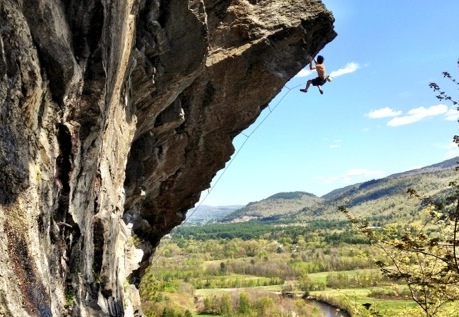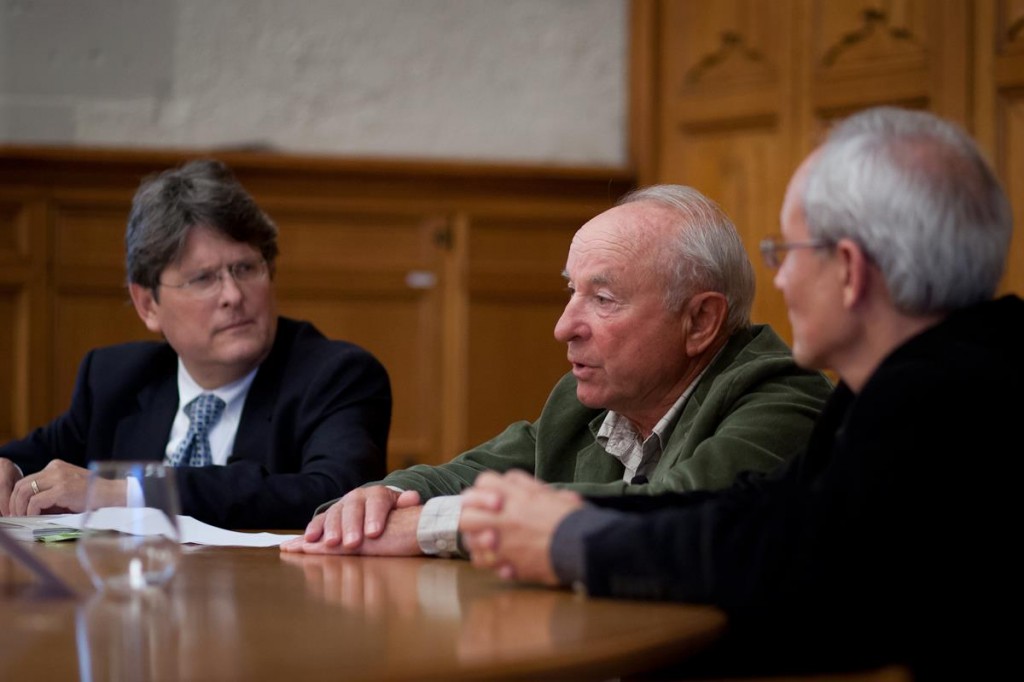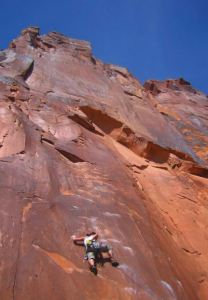
Yvon Chouinard first came onto my radar in 1999.
I was a young lass from the Midwest, transplanted for the summer in southern Utah and awestruck by the dramatic landscapes of the West. Having never traveled beyond the forests of Missouri, I was eager to explore these wild mountains, deserts, and rivers. I soon discovered what would become my greatest passion: rock climbing.
My early climbing mentors taught me lessons in balance and delicate footwork during the day, and recounted stories of the Yosemite Golden Age rock legends over the campfire at night. The names of Salathé, Frost, Robbins, Pratt, and Chouinard were brought to life, through tales of near-mythical ascents up immense granite walls I couldn’t even begin to imagine tackling.
Yvon Chouinard was a central character in the climbing firmament, an emblem of the beautiful lifestyle with which I was falling in love. His climbing heroics, combined with anecdotes about how he taught his children to eat roadkill as a practical source of food, earned Chouinard my early admiration. While I refrained from adopting this unconventional diet myself, his climbing adventures helped inspire me to dedicate myself to the sport, and my own skills began to develop apace.
I learned a bit of history, too, about Patagonia and Black Diamond, two companies Chouinard founded which have long been renowned in the climbing world. At first, however, I had no interest in digging much deeper: to me, Patagonia and Black Diamond were just purveyors of quality products or gateways to further adventures in the mountains. Chouinard was a hero of mine for his rock-climbing feats, not for his business endeavors.
Yet these two worlds converged when I started reading the environmental essays embedded in the Patagonia catalogs. Interspersed amongst pictures of the mountaineering gear for which my sister and I were pooling our savings were essays about endangered habitats and threatened species, and how Patagonia was actively campaigning to save these ecosystems and wild places.
One of the essays that stands out in my memory was one written by Chouinard himself, on the role of grassroots citizen organizations in catalyzing social and environmental change. Chouinard believed that government and private industry lacked motivation to advocate for conservation issues, but local people — farmers, climbers, fishermen, kayakers — who are truly dedicated to their ecosystems, and affected by injustices, can and will fight for the cause. As Bryce Courtenay put it in The Power of One, the book given to me by the guy who taught me to climb, “Little beat big when little is smart, first with the head and then with the heart.”
I read about Patagonia’s commitment to donating 1% of their sales to these activist grassroots organizations, and their vital role in creating the alliance of businesses that have pledged to do the same. I was captivated by their 2007 campaign to protect the Arctic National Wildlife Refuge, and later their Freedom to Roam movement, which focused on establishing migration corridors that allow wildlife to move between protected landscapes. And I remember the influence that Patagonia’s Vote for the Environment campaign had in Boulder, Colorado — my home at the time — during the 2008 presidential elections.
But it wasn’t until Yvon Chouinard came to Yale, where I’m now a Master’s student, that I truly came to appreciate how deeply both Chouinard and the company he founded are committed to fighting environmental crises through every available platform.

During his two lectures at Yale and a personal interview, Chouinard’s story came through to me clear and steadfast: We have grown too big. We are running out of resources. And we all — industry included — need to completely rethink how we live on this planet before it’s too late. Twice Chouinard quoted the legendary environmentalist David Brower: “There is no business to be done on a dead planet.”
Patagonia attempts to address these issues through its business conduct, by focusing on high-quality products, socially responsible labor practices, and a natural growth rate. To be sure, Patagonia has not been perfect: like any other business, they have certainly caused harm in the past. To its credit, however, Patagonia’s business approach is, as Chouinard put it, to “find out what we’re doing wrong and fix it, and then prove to the rest of the world that it’s good business.”
This model is typified by the company’s journey to exclusively sourcing organic cotton. In 1988, Patagonia opened a store in Boston in an old retrofitted building, and within days its employees were complaining of headaches. Environmental engineers found the structural problem to be the ventilation system, which was recycling the same air inside the building, but Chouinard wasn’t convinced: he wanted to know if there might be another cause. The engineers kept searching, and soon discovered that all of Patagonia’s treated cotton garments, such as wrinkle- or shrink-resistant fabrics, contained formaldehyde, the health impacts of which were being exacerbated by the recycled air.
Instead of just fixing the ventilation system, Chouinard promised to switch Patagonia’s entire cotton supply to organic cotton. “If we couldn’t find an organic substitute,” he says now, “we were going to close up and stop selling cotton clothes.” The transformation was difficult, both logistically and financially, but by 1996 Patagonia was providing all its cotton from organic sources.
Chouinard has created a company that challenges our preconceptions of industry, a company that suggests that businesses can indeed profit without harming the environment. Waste and toxic chemical reductions, innovations in bio-based and recycled materials, forays into renewable energy, fair labor practices: across the spectrum of environmental and social responsibility, Patagonia has been a pioneer even as it continues to grow and increase its profits. As Chouinard wryly remarked at the lecture events, Patagonia actually does well in the recession, when prudent consumers pay closer attention to their purchases. “Whenever I am confronted with a business problem,” says Chouinard, “the answer is to improve the quality.”

The notion that consumption is linked to the deterioration of the natural world is a familiar theme in the worlds of environmentalism and corporate responsibility. Less familiar, though, was Chouinard’s intertwined story of how risk sports define his approach to business strategy. And, as a climber, it was this final message that I found most resonant.
Chouinard isn’t asking us to all become risk sport enthusiasts, though I think that might amuse him. What he’s asking is for us to think like risk sport enthusiasts: to understand our limits and live within our means. These are fundamental concepts in risk sports, where the failure to be cautious and prudent results in drastic penalties. Attempt to free solo beyond your climbing abilities or drop blindly into a rapid you cannot paddle, and you may not return to tell your story.
While risk sport aficionados innately yearn to push the limits, theirs is a self-regulated determination, coupled with an acute understanding of their personal capabilities and the consequences associated with their actions. Chouinard cites many of his outdoor adventures as foundational learning moments for building Patagonia, and he uses those lessons to offer a simple, if unorthodox, proposition to the global consumer: Know the limits of your consumption, live within your means, challenge yourself to live as responsibly as you can, and above all, respect the Earth.
The Patagonia mission statement –– “Build the best product, cause no unnecessary harm, use business to inspire and implement solutions to the environmental crisis” –– mirrors these humble requests. Chouinard and Patagonia are working to convince us that it is possible for us to live on this planet and cause no unnecessary harm.
And not only is it possible, it is imperative. Whether we are a corporation or consumer, we are faced with the obligation to reduce our footprint. As Chouinard succinctly concluded during the Yale lecture series: “This is it. This is the planet that we have. And we’d better take care of it.”